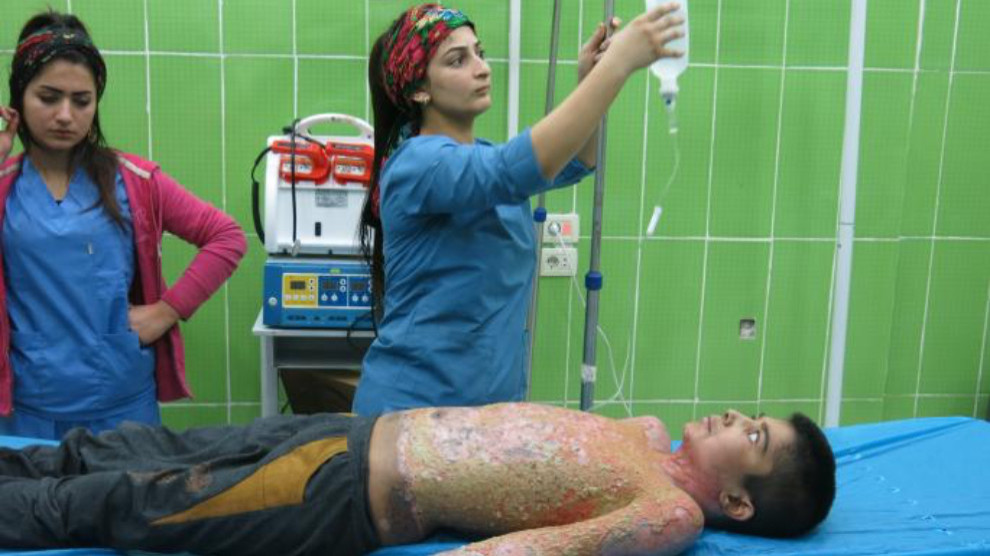Did Turkey use phosphorus bought from the UK against Kurds?
Kurds who have sustained severe injuries have presented compelling evidence of white phosphorus burns in northeast Syria in the past week.
Kurds who have sustained severe injuries have presented compelling evidence of white phosphorus burns in northeast Syria in the past week.

An article by Lucy Fisher of The Times discussed concerns over Britain’s sales of phosphorus products to Turkey amid evidence the incendiary chemical has been used against Kurds in northeast Syria.
The article, titled “UK sells white phosphorus to Turkey as evidence grows of chemical attacks on Kurds” noted that ministers have issued more than 70 export licenses for military products that can contain phosphorus to Ankara in the past two decades.
Citing a leading British chemicals expert, the article said that samples collected from the scene of suspected chemical attacks and from the burns of victims, could be analysed to identify the country of origin of any white phosphorus found.
“Kurds who have sustained severe injuries have presented compelling evidence of white phosphorus burns in northeast Syria in the past week. The Times saw first hand the burns of Mohammed Hamid, 13, a Syrian Kurd who, according to witnesses, was burnt during an attack by a Turkish jet at midnight on October 16.”
The British daily noted that a doctor in a field hospital in Tal Tamir said last week that he had treated at least 15 people who displayed evidence of incendiary chemical burns. The Organisation for the Prohibition of Chemical Weapons is now investigating the possible use of chemical and incendiary weapons during President Erdogan’s offensive into northeast Syria.
“Phosphorus is commonly used as the key component of smokescreen and illumination shells in militaries across Nato, including the British army. This usage of the chemical – in grenades, air munitions and artillery shells – is permitted by multilateral treaties”, said the article and added that the deployment of phosphorus in an incendiary attack directed against people is, however, restricted by the Geneva and Chemical Weapons Conventions.
Earlier this month Dominic Raab, the foreign secretary, told parliament that no further export licences “for items that might be used in military operations in Syria” would be issued to Turkey until a review had taken place, after President Erdogan launched his surprise offensive against the YPG.
Hamish de Bretton Gordon, a former commander of the UK’s chemical, biological, radiological and nuclear regiment, said it is “almost certain” that the phosphorus products Britain has sold to Turkey in recent years is of the white phosphorus variety.
“If we had samples [of the chemicals used in attacks on Kurds this month], it would probably be possible to work out where that phosphorus came from, whether it was Syrian or Nato stock. It would potentially be possible to do a backwards attribution of where phosphorus came from [at a country level],” he said.
He added: “Phosphorus burns incredibly intensively. On people, it burns even more vigorously when moisture is involved.”
Jamie Stone MP, the Lib Dem defence spokesman, said British sales of military phosphorus products to Turkey was “deeply concerning” and added: “I will raise it at the first opportunity in the House of Commons Monday – either by means of an intervention or an emergency question.
“It is clear the government has questions to answer. If we wave fingers at other nations, we’ve got to be squeaky clean ourselves.”
A government spokeswoman said: “We are monitoring the situation in Syria very closely when assessing export licence applications against our strict licencing criteria. We keep all our defence exports under careful and continual review.”